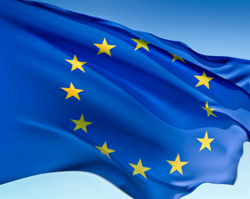 THUNDER BAY – International News – The future of Europe: towards a genuine Economic and Monetary Union was the topic of a speech by Maroš ŠefČoviČ, the European Commission Vice-President presented today in Dublin Ireland.
THUNDER BAY – International News – The future of Europe: towards a genuine Economic and Monetary Union was the topic of a speech by Maroš ŠefČoviČ, the European Commission Vice-President presented today in Dublin Ireland.
The Future of Europe
Chairman, ministers, honourable members, colleagues, friends
Thank you very much for inviting me to join you here at your meeting in this prestigious Castle which bears the weight of Irish (and European) history.
As I’ve said many times already since the start of the Irish Presidency, I am sure that the experience and dedication of the Presidency team will help us achieve real results for Europe. To do that, we need the support and commitment of parliamentarians – both national and European – and that is why it is so important that we are all here together today to discuss no less a topic than the future of the Economic and Monetary Union, as well as the democratic challenge that will inevitably have to be addressed in parallel.
Confident as I am that we will see tangible results under the Irish Presidency, there is of course no quick fix to our current crisis. Over the last five years, the EU has faced serious challenges that have affected not only governments or businesses but also inevitably its 500m citizens.
When EMU was first developed, certain common economic policies were agreed by all, with rules clearly set out for all to follow. However, some Member States ignored them or bent them. Instead of keeping public finances under control, they instead accumulated large private and public debts, leading to loss of competitiveness and macroeconomic imbalances.
Under the impetus of the Commission, we put in place the Europe 2020 strategy, designed to encourage the necessary structural reforms to create real economic growth and jobs. The problem, however, was that the success of Europe 2020 depends on one main prerequisite – a well-functioning EMU! It became clear that we needed a thorough overhaul of the economic governance of EMU, one that better reflected the interdependence of our economies over the last few years. So that is what we did – bringing in new measures such as the six-pack and the two-pack, the European Stability Mechanism, or more recently, the single supervisory mechanism for banks. These are not only proving to be the right responses to the current euro crisis, they are also setting the firm foundations for a stronger, deeper and more effective Economic and Monetary union to ensure that Europe never sees another crisis on this scale again. They help build confidence with the financial markets and allow us to move beyond crisis management mode.
But it is also obvious that the economic crisis has also created a crisis of confidence not only on the part of financial markets but also, and more importantly, with our fellow citizens. In many ways that is harder to combat. To tackle this crisis, we need to be able to restore trust – trust in the Single Market, the potential driver of so much growth; trust in the euro itself; trust in our economy; trust in our ability to take the big decisions that are needed and to make them work; trust in the legitimacy of EU action.
The latest Eurobarometer survey of public opinion across the EU from December 2012 makes interesting reading when it comes to this issue of trust: the polls show that while trust in the European Union has increased since spring 2012, at only 33% this could hardly be described as a ringing endorsement. Since 2010, these opinion polls show a significant decline in the trust that citizens have in both national and EU institutions – only three or four out of ten Europeans trust the European Parliament, the European Commission, their national parliament or national government. More worrying: distrust is now much higher (between 46% and 66%).
To reverse the trend, we need to go back to basics – to deal with the fundamental issues facing Europe’s citizens, businesses and governments. We need to act collectively, to find long-lasting solutions to the crisis; to what citizens have identified as their main concern (according to Eurobarometer surveys, Europeans consider that the most important issues facing their country are, in decreasing order: unemployment, the economic situation, rising prices, government debt, health and social security). But more, we need also to set out a clear vision of and path for what needs to done to ensure deeper EMU – and how and by when we expect to achieve it. All of which needs to be supported by unequivocal commitment from both EU and national institutions.
This is what the Commission set out to do in its Blueprint for deeper EMU published on 28 November 2012. The aim of the blueprint was to marry the ambitious proposals for action with a realistic timetable, at the same time assessing what means would be necessary to achieve the goals – in particular, whether Treaty change is needed or not.
At their European Council meeting in December 2012, EU leaders discussed a proposal from President Van Rompuy, influenced in part by the Commission’s blueprint. Indeed, the European Council conclusions endorse many of the proposals contained in the Commission’s blueprint for the immediate term, such as ex ante coordination of major national reforms; contractual arrangements between the Member States and the EU institutions; and solidarity mechanisms at EU level to support the implementation of reforms. These are a solid basis on which to start, but we will clearly need to go further.
In its blueprint, the Commission makes it clear that genuine economic and monetary union can only be achieved if all 27 (soon to be 28) EU Member States are on board. There is no question of undermining the integrity of the Single Market – perhaps our greatest collective asset and one that will have to perform to full capacity if we want any hope of achieving lasting growth.
That said, for obvious reasons, there is also a need to tackle issues specific to the members of the euro area, who must be free to deepen the degree of their policy coordination and integration more rapidly.
The blueprint, with its roadmap of actions necessary in the short-, medium- and long term to bring about a genuine EMU, is designed to balance both these needs. More than that – and this of course is a key issue for you as representatives of the people – it also proposes measures to ensure greater democratic legitimacy and accountability throughout the whole process.
It focus on four phases of priority – immediate, short-term, medium-term and long-term.
We believe immediate priority should be given to implementing and enforcing the measures we have already agreed on economic governance (such as the six-pack), as well as the rapid adoption of the current Commission proposals such as the two-pack and the Single Supervisory Mechanism.
Just as importantly, we also need a rapid agreement on a new long-term investment budget for the EU – the MFF. How can we possibly hope to do anything when there is so much uncertainty about precisely how much we can invest? Furthermore, how can we realistically hope to tackle that crisis of confidence I talked about when there is such a credibility gap between what we agree needs doing and our unwillingness to invest sufficiently in doing it? That’s why a quick decision is needed on the next MFF, and as views on the EU budget differ widely at the moment, we need to make convergence a top priority to ensure a sensible, sustainable and above all effective agreement.
Moving on to the short-term, we are looking at a number of actions.
One example is the creation of an instrument – the competitiveness and convergence instrument – to improve overall economic policy coordination through closer dialogue with Member States, and their national parliaments, with the aim of encouraging stronger ownership of reforms which should make them more effective. To do this, we are proposing contractual arrangements with Member States – an obligation on their part to do what they say they will do, matched by a guarantee of EU funding to facilitate the implementation of important structural reforms.
Finally, as regards short-term proposals, we will also suggest the creation of a Single Resolution Mechanism to deal with banks in difficulties.
As for the medium-term (by which I mean 18 months to 5 years), the blueprint envisages moving towards a degree of budgetary integration – or putting it another way, sharing of sovereignty. These include a European right to require a revision of national budgets in line with European commitments and the creation of a proper fiscal capacity for the EMU to support the implementation of policy choices resulting from the deeper coordination. Some of these elements will require amending the Treaties.
This also applies to the proposal for a European Redemption Fund which is put forward as a means of reducing public debt significantly exceeding the criteria set out in the Stability and Growth Pact. We also propose eurobills as a means of fostering further integration of euro area financial markets. These options would also require changes to the Treaty.
Finally, in the long-term (more than 5 years), the European Union should move towards a full banking union, a full fiscal union and a full economic union. Based on the progressive pooling of sovereignty, it should be possible to create an autonomous euro-area fiscal capacity that will help Member States absorb asymmetric shocks.
We also believe that once this deeply integrated economic and fiscal governance framework is in place, it should be possible to allow the common issuance of public debt based on that fiscal capacity, which would enhance the functioning of the markets and the conduct of monetary policy. Finally, the Union would have the means to impose budgetary and economic decisions on its Member States under specific and well-defined circumstances.
Now, of course, I know that a lot of these suggestions will not be to everyone’s taste; certainly at least in some Member States, the talk is rather of repatriation of powers and a looser union rather than the deeper integration we believe is necessary.
For the Commission, this is the only viable route to take, but nonetheless, we have to recognise that the gap between what we believe needs to be done and the public perception of the role of the EU is widening rather than narrowing. That is why it is essential that whatever we do is shown to have complete democratic legitimacy and full accountability to the citizens of Europe
With this in mind, it’s obvious that we cannot talk about Economic and Monetary Union without mentioning the necessary parallel development of a political union, with reinforced democratic legitimacy and accountability. To this end, we need to deepen the democratic fabric of our multi-level system. We need to substantially reinforce the role of parliaments at both national and European level. This is an integral part of the blueprint which, on this topic, purposely opens avenues for a much-needed debate with the European and national parliaments on how to improve EU democratic accountability and legitimacy. Rather than imposing its own point of view, the Commission’s aim is to allow for a “shared ownership” of the debate and the measures to be taken to enhance the democratic dimension of the new EU economic governance architecture. To a very large extent, we are moving into unchartered territory.
As a starting point for this shared debate, the European Commission proposes that any work on democratic legitimacy be based on two basic principles:
First, we need to ensure that accountability for decisions taken falls precisely at the level where that decision is made, whilst also taking due account of the level where the decision has an impact.
Second, in deepening economic and monetary integration, we must ensure that the level of democratic legitimacy remains commensurate with the degree of transfer of powers from Member States to the European level.
So much of the political talk at the moment is about ‘Europe’ as the enemy, as something to be fought against, an out-of-control monster content only to rip yet more sovereignty away from democratically elected national government. This explains in part the declining trust in both EU and national public authorities.
However, these perceptions are based on half-truths: yes, powers are being transferred to the EU level – but they are not ‘ripped away’. How could they be!? Every Treaty change has to be agreed unanimously, and democratically endorsed or scrutinised by every national parliament. Most recently, enhanced scrutiny powers have been given to both the European parliament and the national parliaments in the Lisbon Treaty. We need to go further into that direction.
As the blueprint clearly states, National Parliaments will always have a crucial role to play in holding their respective Member States to account for the decisions they take not only within the European Council and the Council but also for those they take regarding national fiscal and economic policies, especially as European level coordination of these policies becomes increasingly important.
But more than that, national parliaments also have a vital role to play in bridging the so-called ‘democratic gap’ between ‘Europe’ and its citizens. This is not only because they of course will have to endorse that change when adapting their national legislation, but also because, as the representatives of European citizens, they have a vital role in explaining and debating the change with their constituents.
This is why the Commission is committed to stepping up dialogue with national parliaments on Annual Growth Surveys and Country-Specific Recommendations. The dialogue on the AGS is of particular importance since it guarantees NPs’ ownership at the start of the cycle. It would provide an opportunity for national parliaments to feed in their views (through MS, or directly via the political dialogue with the Commission) in view of the Spring European Council. An enhanced ownership from the outset would also encourage national parliaments to get more involved at the national level before adoption of the National Reform Programmes and Stability and Convergence Programmes.
Direct contacts between the Commission and National Parliaments could intensify after the Country Specific Recommendations are adopted, to enable National Parliaments to play a defining role in the crucial juncture between the European and the national Semester, i.e. the second half of the year during which budgets and reform programmes are proposed by governments and adopted by parliaments. The Commission could thus be given the opportunity to explain its position to the national parliaments concerned. To this end, I will continue to promote and encourage visits to national parliaments by not only my fellow Commissioners but also, as positive recent experience has shown, by senior officials in charge of economic governance issues.
In the blueprint, we also propose that contractual arrangements be introduced between the Commission and Member States for the delivery of major structural reforms. These contracts would have to be based on full domestic and European ownership and accountability – and I stress the word ‘domestic’ here. Approval of reform agreements by national parliaments would therefore be essential. The contractual arrangements would mean that both governments and the Commission would be accountable, respectively, to national parliaments and the European Parliament for the content and implementation of their duties under the agreements.
As the blueprint also clearly emphasises, the European Parliament has the primary role of ensuring democratic accountability and scrutiny at European level. Further economic integration should therefore result in commensurate involvement and direct participation of the European Parliament.
For example, it could already be possible to involve the European Parliament at key moments of the European Semester, such as prior to European Council discussions of the Commission’s Annual Growth Survey or ahead of the adoption by the Council of the country-specific recommendations (CSRs). Another practical measure is the Economic Dialogue set up as part of the Six-Pack which provides for discussions and channels between the European Parliament, on the one hand, and the Council, the Member States, the Commission, the European Council and the Eurogroup on the other hand. The European Parliament should also be regularly involved in the preparation and implementation of the adjustment programmes concerning Member States receiving financial assistance, as foreseen in the Two-Pack legislation.
In those areas where Treaty change is likely, there are several measures proposed to ensure stronger democratic accountability. These include introducing co-decision on the integrated guideline. We also suggest increasing democratic accountability over the ECB as far as it acts as banking supervisor.
With these different but complementary roles, it’s clear that you, as national and European parliamentarians, will need to talk to each far more as economic governance becomes more deeply integrated and national decisions have wider implications across Europe. Interdependencies of decisions go hand-in-hand with intensified inter-parliamentary cooperation. That’s why we welcome the initiative taken by the European Parliament to organise a parliamentary week of the European semester. The Commission will take an active part in this forum – I myself will participate in the closing debate on Wednesday.
This interparliamentary cooperation is of utmost importance. It does not replace but complements the accountability channels which I have just sketched out. Article 13 of the Fiscal compact provide the relevant tools for such cooperation and it is now for the parliaments to put these provisions into practice. Proposals are already taking shape on this – be it the Gauzès report which I already had the opportunity to discuss with the French National Assembly, the working paper from Speakers of the Parliaments of the Founding Member States, or the work launched in COSAC. I very much welcome these contributions and the debates that will follow on this basis. Whatever the ultimate shape of this inter-parliamentary cooperation, the Commission stands ready to offer its assistance and participate in such fora.
As the discussion at the December European Council shows, there is broad agreement that we need a credible vision for economic governance. We have to act quickly and decisively now to tackle our most immediate problems, but the actions we take need to be – and be seen to be – coherent with a medium- and longer-term strategy of closer integration. We cannot simply fight the fires, we need to make our entire economic governance completely flameproof.
In the coming months, we will focus on the important decisions that have just been taken and on the immediate next steps to put them into practice. It is crucial to maintain the momentum in this process.
I want to make it clear that the Commission’s blueprint is just the start of the discussion on these important issues. Its aim is to kick start a wider debate. The upcoming 2014 elections will help in that endeavour, all the more so if each European Political Party succeeds in presenting its own candidate for the post of President of the Commission. Thus not only national parliaments but also European Political Parties are key actors to help reconnect citizens at national level with European politics and institutions. [This is why we have issued a proposal on a statute for European Political parties and hope to have it adopted by the EU legislator in time for the European elections]
The euro is as an asset that benefits all Member States. What, sadly, stops it from being so is the necessary political support and framework, with full democratic legitimacy and a clear vision, that would allow it to be trusted by the markets. This is the reality of the world in which we live: if we want to succeed in our efforts to create jobs, to stimulate growth, to bring stability to Europe’s economy, we need to restore trust and confidence. Our vision for deeper economic and monetary union will, we believe, do just that, provided it is accompanied by the necessary political will and commitment to make it succeed, by a sense of “shared ownership” on the debate and reforms ahead.
I look forward very much to hearing your views and sharing the discussion.
Thank you for your attention.






